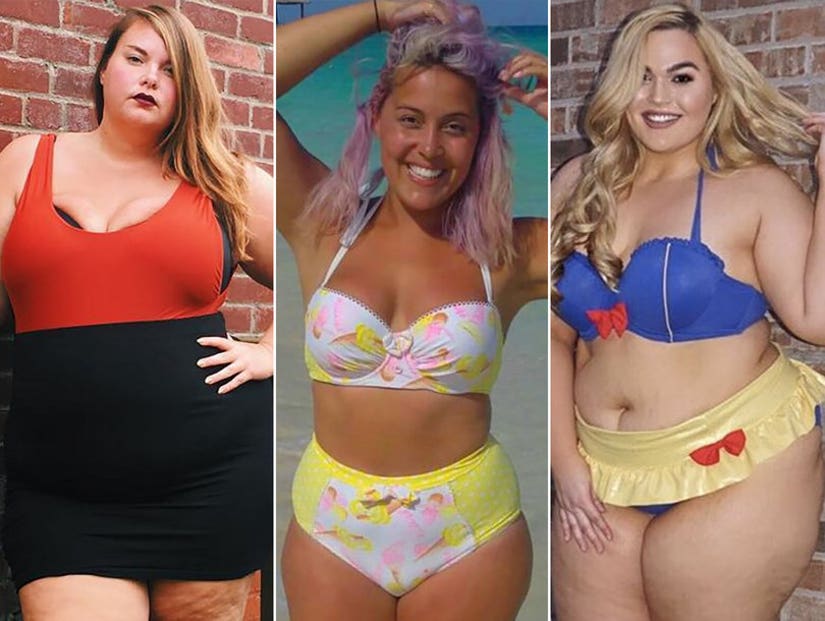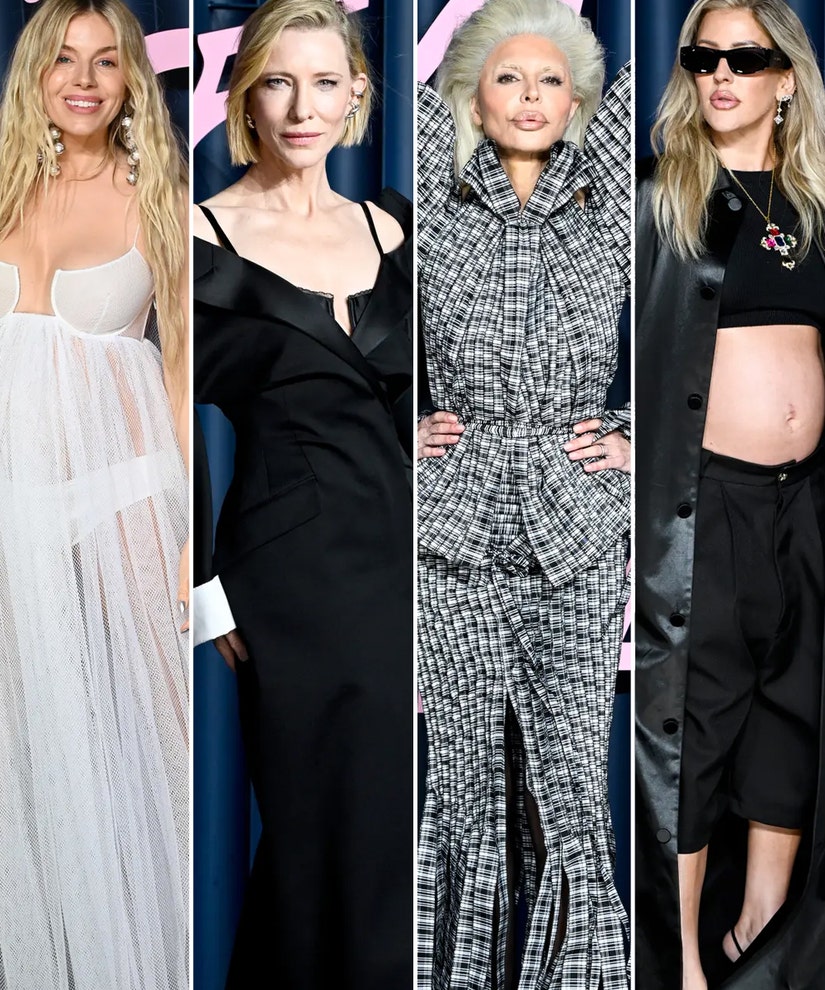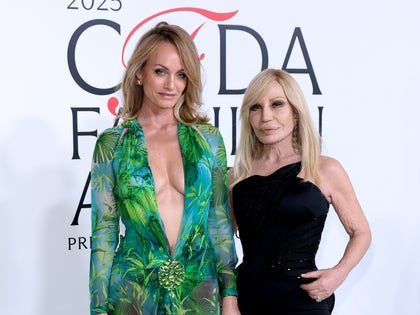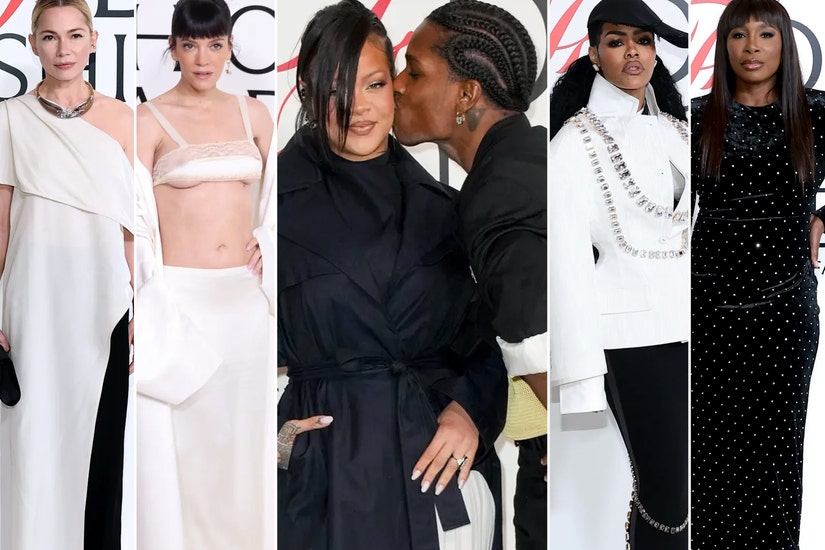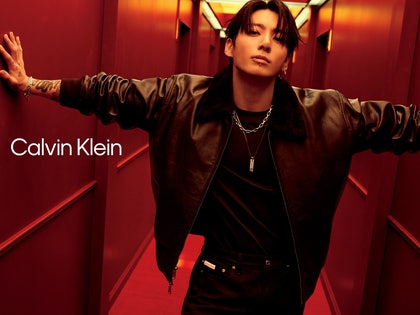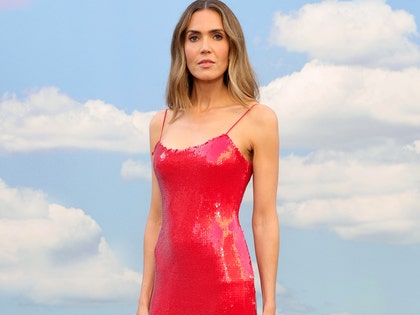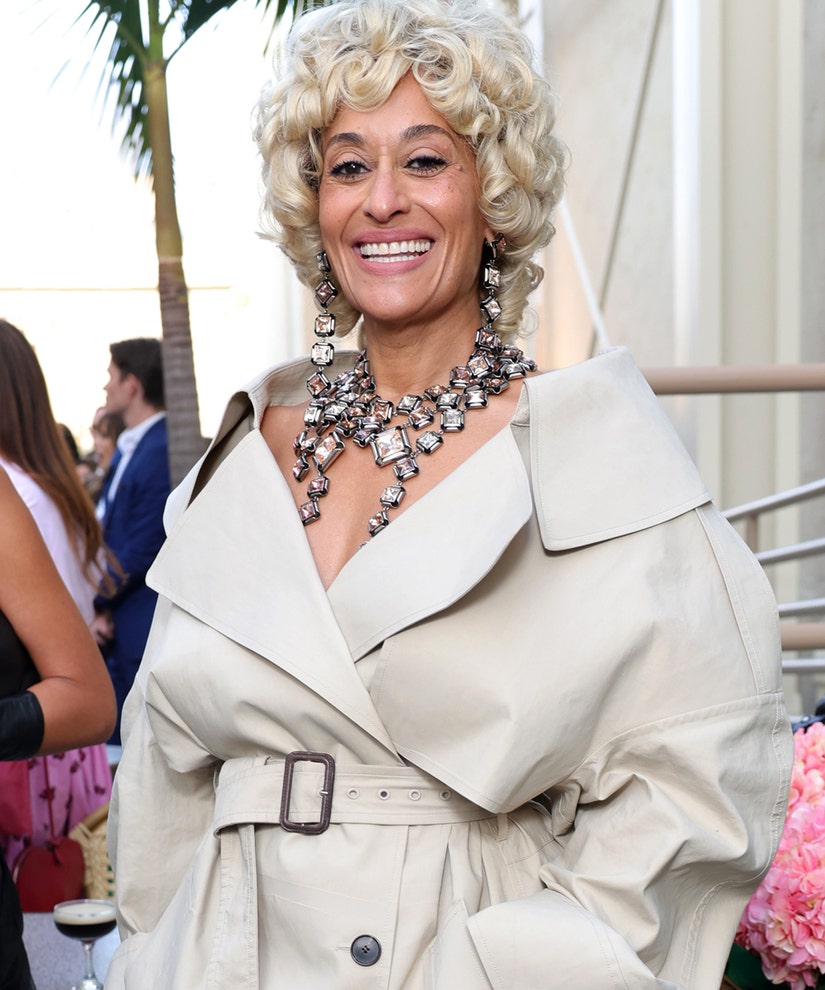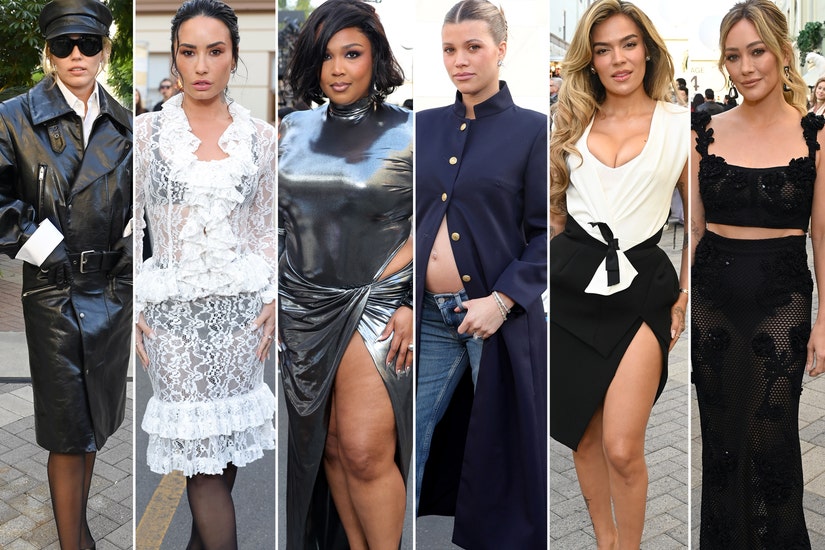"Body positivity" is a rapidly growing movement that has swept through American culture, social media and digital media, but in many minds, the question still remains: What exactly is it?
TooFab spoke with five body positive models, influencers and businesswomen about their takes on what it means to be a body positive role model on Instagram -- and in their personal lives -- as well as what society can do to break down the barriers between what is body "acceptance" and what's simply tolerance.
Megan Crabbe, Loey Lane, Melissa Gibson, Rosa Barney and Nadia Aboulhosn gave us their perspectives on everything from body positivity to fat-shaming to toxic relationships in a stripped-down, revealing roundtable interview.
Read their enlightening answers about body positivity, sexual objectification and self-esteem in the following interview tackling the complex issue.
What does 'body positivity' mean to you?
Rosa Barney: To me body positivity means understanding that there is beauty in what makes us different. For such a long time our society idealized one version of beauty but we don't all fit into one mold, we are not all one size or one shape. Body positivity is about learning to be comfortable in your own skin; it's about self-care and about ending the cycle of negativity that usually starts inside of us.
Nadia Aboulhosn: To me being body positive means praising the good qualities about you vs. shaming yourself for what you don't think looks good or what society believes doesn't look good.
Loey Lane: It means looking in the mirror and feeling pride in the way that you look at every stage in life. We are changing constantly; the idea of having a "perfect body" with curves in only the places deemed appropriate by society 24 hours a day, seven days a week is just not possible. Body positivity is accepting ones self in every stage and fluctuation.
Megan Crabbe: For me, body positivity means accepting your body as it is, and seeing equal value in every single body type. It's a movement that's trying to give all of those bodies that have never been celebrated by the mainstream media, the representation that they deserve.
Melissa Gibson: Body Positivity is a political movement. It seeks to address the specific experience of people who have marginalized bodies. These include women, fat folks, disabled people, trans people, people of color and people who are aging. Body Positivity is a movement and a conversation, its about people representing their own lives to demonstrate the reality of their lives in their marginalized bodies to break down the stigma they face. Body positivity is about celebrating all bodies and valuing all people regardless of the kind of body they have.
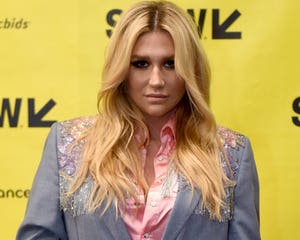 Getty
Getty
Kesha Tells Paparazzi and Body-Shamers to 'Kiss My Fat Ass' (Photo)
View StoryMany think that body positivity only applies to women of a certain 'size' being OK with the way that they look, but it's so much more than that. What would you tell those operating under the misconception that body positivity just for traditionally 'plus-size' women?
Rosa Barney: Body positivity is for everyone. People of all sizes and genders have difficulty learning to love themselves. It is about understanding that “healthy and happy” looks different on everybody. For me personally body acceptance is such a small part of what body positivity is -- being positive about your body means treating it with love and care. This means making healthy choices, eliminating the negative way that we talk about ourselves. Learning to accept a compliment instead of deflecting it. Our relationship with ourselves is the longest relationship we will ever have so we might as well make it a good one!
Nadia Aboulhosn: I don't believe that body positivity is just for one type of person. SO many people get shamed for their bodies, or hair, or skin color, or whatever other feature they have so it's really just about recognizing you're unique and whatever someone else might see as a flaw, someone else could praise it. There have been plenty of women who contact me that are thin and fit what society thinks is beautiful and tell me how much I've helped them come to terms with themselves because they were unhappy too.
Megan Crabbe: Body positivity is absolutely for all bodies. It's important to remember that the roots of body positivity are the fat acceptance movement, which is why fighting against fatphobia and giving visibility to plus size women is such a key part of it, but people of all sizes experience body image issues and body positivity is there to help all of them. And it isn't just about size either! True body positivity should encompass skin color, age, gender, and ability as well.
Loey Lane: Many people mistake body positivity for "fat acceptance," which I think goes to show how unhappy they must be in their own skin to think that loving the way you look is wrong. Very thin people can feel uncomfortable in their bodies or like they need to change to look beautiful. Body positive is not a one-size fits all suit, it's something everyone and anyone can work towards.
Melissa Gibson: I would say that while body positivity was created by plus size women, along the way we have recognized that there are many types of bodies that experience intense discrimination in our society. Body positivity also recognizes how the fear of fat affects almost every single person. We've created an idea of what it means to be fat and our culture has become obsessed with doing everything possible to not be fat, often at the expense of our physical, mental, and emotional health. The amount of time we spend as a society trying to look a certain way is astounding and for so many of us, it keeps us from being about to invest in other aspects of our lives that make us happier. The stigma against marginalized bodies affects us all, for some, those who have marginalized bodies it is the reality of our lives, for those who don't currently have marginalized bodies are affected by it in the sense that we often live in fear of becoming someone with a marginalized body and do everything we are taught will prevent it.
Have you ever been told or asked to lose weight by either a management agency or someone in your family/circle of friends/boyfriends/girlfriends? How did that impact the way you feel about yourself, and how did it teach you to embrace body positivity?
Rosa Barney: Growing up I was always told that I am “big boned” so I need to watch what I eat to avoid getting too big. It was a constant struggle for me because I ate a healthy and balanced diet thanks to my parents, I played sports – I did all the right things but I was never the right size. That's how I know that body positivity is crucial. I don't want anyone else to battle with the insecurities I had. It took a long time for me to find my confidence.
Nadia Aboulhosn: Growing up I had some family members tell me I needed to lose weight, I think one guy tried to shame me, none of my circle of friends did it because I try to only keep people who praise me around me. I don't want anyone around me to look down on me and if they do, then they could go. Whenever people called me fat I never really got upset about it. This idea that being bigger is the worst thing ever is ridiculous. It was always the people who had a ton of flaws pointing a finger at me. Their opinions of me didn't hold any weight because I didn't let it. Any time I ever tried to lose a few pounds it has been from how I feel about myself. If I ever felt not like myself, I'll go on a diet for a few weeks, work out more until I feel like myself again.
Megan Crabbe: I've spent my whole life trying to lose weight to fit into the societal standard of what a perfect body looks like. Three years ago I realized that I just couldn't spend any more years starving and hating myself for the promise of happiness in a smaller body. I realized that I had to take my happiness as I was.
Loey Lane: I've felt pressure from others who were uncomfortable in the way that I looked to lose weight or maybe dress more conservatively until I was thinner. In the past it certainly affected my self-image and I felt shame for looking so undesirable. Now, when faced with those sorts of comments, I just walk away. You have to -- there's no point in wasting time or energy on hating yourself or the way you look.
Melissa Gibson: It was definitely a continuous conversation in my family growing up. I think my parents did what they were taught to do. I was always a bigger girl and my parents got me my first gym membership at nine years old and I was constantly on a diet -- including many fad diets. What this did to me was make me feel like I was never good enough. Over time I felt increasingly disconnected from my body and I stopped being present in it. I saw it as broken. But it wasn't! There was nothing wrong with my body, it did everything I wanted it to do. It kept me alive, but the idea that it was too big, made me hide. Body positivity made me question that. It allowed me to see bodies that looked like mine living their life now, not simply existing as a continuous work in progress, waiting to do anything until I was an appropriate weight.
Do you feel there's a certain level of hypocrisy in women on social media who have 'perfect' bodies promoting body positivity by using their 'flaws,' when by 'normal' standards, there are none? Does that feel exploitative to you?
Rosa Barney: Everyone has their own personal struggles with their body. What you and I may perceive as perfect might be very difficult for them to love and accept. That being said I think it is important for these women to be honest about their bodies, what they are eating and how much they are working out to achieve what we see on social media. Though I am a plus size model I work out at least 4 days week – not because I hate my body, I do it because I love my body and I want to treat it well.
Nadia Aboulhosn: I think all women and men should promote body positivity whether they have a “perfect” body by societies standards or not. People get shamed all the time and people have insecurities about themselves whether they let other people know about them or not.
Megan Crabbe: I'm all for women of all shapes and sizes embracing their bodies and discussing their body image issues online, even if they do look flawless to other people. But I think it's important for people who are more conventionally beautiful and hold more privilege to be aware of that, and question "Who is this helping?" when we post on social media.
Loey Lane: I think it's an eye-opening experience when someone you may feel has a "flawless" body talks about what they find flawed in themselves. It showcases that we all struggle, we all have things we might not be completely comfortable with. Body positivity is absolutely for everyone and should be celebrated by any human of any size.
Melissa Gibson: Absolutely! The current trend that equate body positivity with self-love is so exploitative of this radical movement. Self-love will not change how people with marginalized bodies are treated by others and experience the world. When people with thin bodies contort their body to make it look bigger or create rolls or who focus on simply the love of specific parts of their body that are usually associated with fat bodies, they are still placing those characteristic as things that are flaws and then promoting another hierarchy that preaches that self-love is the goal of body positivity, which we expressively know it is not.
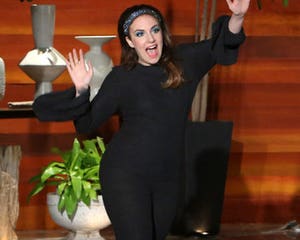 Michael Rozman/Warner Bros.
Michael Rozman/Warner Bros.
Lena Dunham Thinks People Calling Her a 'Hypocrite' for Losing Weight Is 'Just So Crazy' (Video)
View StorySo many people on Instagram think they're leaving great comments by telling you that they love a specific part of your body, but really, it's just objectification. How do you combat that, and what do you think society can do to stop this from continuing?
Nadia Aboulhosn: I think that educating others about what is objectification versus a compliment will prevent those situations. There are people who have good intentions while commenting these things but in reality it could be looked at as objectification.
Megan Crabbe: Anytime I feel that my pictures are being sexualized or objectified by (usually a male) user online, they're instantly blocked. I don't do what I do for the male gaze, I'm not there to be visually appealing for them, I'm there to help people overcome their insecurities and embrace their bodies. I'm zero tolerance on creepy straight dudes thinking body positivity is about their boner.
Melissa Gibson: Haha, I call it out. Well, not every time, but I have asked specific people to stop that, especially if it prizes parts of my body over other marginalized groups, such as skin color, or body shape. I have also made some very specific posts about my frustration and feelings about these comments. Not all compliments are the same. As a visible woman on the internet and specifically a fat woman on the internet, navigating my own assertion of who I am in a world that is constantly defining who I am because of the way I look and my gender is really exhausting. Add to that the fact that people then take my self-representation and then make it about how they feel about my body or what it does to them or how it turns them on or to see me a set of body parts instead of a whole person, yeah, it sucks. Defining myself is empowering. When individuals take that and make it about how they see me, even if it is so called positive, but its inevitably objectifying or fetishizing.
What does it mean to you to be sexually objectified or fetishized?
Rosa Barney: I don't do this for the sexual attention. When I show my body or wear something sexy I am doing it to celebrate myself and my confidence. I feel so liberated and happy today, more than I ever have before. It took me such a long time to love my body and accept myself so now I want to share the way I feel with my followers and help them feel the same way about themselves. If someone takes it upon themselves to sexualize what I am doing then that is their choice but that's not my objective.
Melissa Gibson: Sexual objectification is when a person is valued as an object or for simply their body and not the whole complex human that they are. Fetishization is when a sexual act or type of body are hyper sexualized by someone and often contributes to objectification. Both happen to people with marginalized bodies all the time. We are seen as being abnormal and our bodies are separated from the person we are.
How do you feel about very thin women promoting body positivity on social media? Do you feel that it treads into questionable waters or sets a contradictory example?
Rosa Barney: There is no size requirement for body positivity. It is not just for plus size women, it is for EVERYONE to love and accept themselves. Just as we shouldn't “fat-shame” we need to make sure we don't “skinny-shame,” if someone is thin (and that is their true body type) then as long as they are healthy and happy I am happy for them as well.
Nadia Aboulhosn: I see how it can be questionable because thin women are accepted more in society and mainstream media but I think it's important for all shapes and sizes to be body positive. You never know the extremes some people may be going to get certain bodies. They may appear to some people to have the “perfect” body but that doesn't mean they feel that way about themselves.
Megan Crabbe: I don't think there should be any size requirements for promoting body positivity. The problem only starts when people start combining body positivity with diet culture, or thin bodies take up all the space without acknowledging their privilege and making room for bigger bodies as well.
Loey Lane: We live in a society that glorifies working towards a thin body in order to wear a bikini in the summer. What so many people who don't have a smaller frame may not realize is that feeling insecure or body conscious is a mental struggle. No one hits a certain weight, snaps their fingers and never feels insecure again. The more we promote body positivity, the more outreach we have to people across the world who might be struggling in their own skin. Thin women should absolutely promote body positivity. Anyone should.
Melissa Gibson: I believe that we thin people can definitely be an essential part of the body positive movement but that it is precisely because of their privilege that they are held to a higher standard. They must educate themselves and others about the unique experiences more marginalized people have within the movement and must be careful to not take up too much space. They should not be the face of the movement, just as a white person should not be the face of Black Lives Matter, but they are expected to do a lot of the work. In my opinion, I find quite a lot of thin women who use the platform for their own popularity and have reframed and redefined what body positivity is to center their experience. They are more palatable so when people take notice of the movement, especially in the media, they are often the people who get their voices heard and are seen.
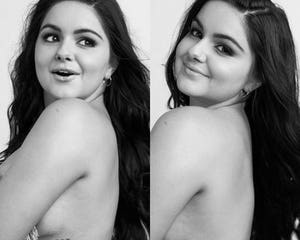 Getty
Getty
How Ariel Winter Survived Her Drastic Body Changes
View StoryHow do you feel about being a role model for body positivity?
Rosa Barney: I am honored to be a role model for body positivity. When I get emails or messages on social media from people all over the world telling me that I have helped them learn to love their bodies and to find their confidence I feel overjoyed. I lived the same struggle that so many people out there are going through. I think that people feel they can relate to me and if I can help one person or thousands I will be happy.
Nadia Aboulhosn: In the beginning years, I didn't understand why so many people were shocked to see someone like me. I didn't think it was a big deal for someone my size to be so comfortable with themselves but years ago it was rare on social media. I learned through the years that girls needed to see themselves represented in main stream media, magazines, and fashion. It's humbling that I can make someone think different of themselves in a positive way just by being on social media.
Megan Crabbe: If someone had told me 5 years ago that I would be any kind of body image role model, I would've just assumed that I'd finally lost weight and become some kind of fitness model! I was probably the least likely person to ever make peace with my body. But now I have I'm honored to be a part of other people's body positive journeys, I'll I've ever wanted to do is spread the word and show them that there's another option to hating your body forever.
Loey Lane: It's the most gratifying experience of my entire life. When I was young and I hated myself because of the way that I looked, I wish I had someone who showed me that I was beautiful the way that I was. The fact that I can impact another person in that way is very personal for me and hasn't lost that magical spark. It never will.
Melissa Gibson: I am beyond grateful for the platform and for the continuous support. It has been such a huge positive space in my life and the interactions I get to have and people I have met have been some of the biggest gifts in my life. I also do realize that it is precisely because of my own privilege that I have such a large following. I am a white, able-bodied, cis-gendered, straight woman in my twenties and with an hour glass figure (with lots of extra). In many ways, I am palatable because I somewhat resemble something that people are comfortable with. I am still over three hundred pounds, but I understand that that privilege means I don't always get to shy away from the hard conversations and that I must be political. I take that very seriously and I am lucky enough to have been educated in race and gender issues, so I make sure to talk and educate about these issues whenever possible.
What kind of mental and emotional obstacles did you need to overcome -- if applicable -- before you realized that you were simply beautiful the way you are?
Rosa Barney: I needed to realize that I am in control of my happiness and the only way I will feel beautiful is if I understand and accept who I am. It was really hard for me as a kid and as a teenager, I was always bigger than my friends. I felt so out of place, I couldn't share clothes with my friends at sleepovers, I would hunch down in photos to seem smaller. It was a terrible cycle of negativity. It wasn't until I was approached to model that my outlook started to change.
Nadia Aboulhosn: I needed to come to terms with myself and understand this was my life and no one was going to be in control of my thoughts about myself. I went through A LOT growing up and it put things in to perspective for me at an early age. I had close people to me die and it helped me understand how fast you can go so I wanted to make the most of my life, and the only way to do that was to start with myself. I was already hard on myself, I wasn't going to let other people be hard on me too.
Megan Crabbe: I've hated my body since I was 5 years old and convinced that all the other girls were so much thinner and prettier than I was. At 14 I was diagnosed with anorexia nervosa, and I'm extremely lucky to even be alive today. After recovery I spent years cycling through crash diets and binge eating, until finally I found body positivity at 21 and everything changed. I learned how to accept my softness, heal my relationship with food and my body, and finally fully recover.
Loey Lane: I lost a lot of weight when I was younger and never saw a difference in the mirror. My clothes were no longer fitting, I was 10 sizes smaller and yet I still cried over the way that I looked. There was a mental barricade my entire life that prevented me from appreciating all of the positives that my body does for me. It lets me walk with my dogs, hug my friends, run from meeting to meeting and never giving out. I would be nothing without it and it deserves love and appreciation for all it does for me. I'm in a healthier place now, mentally and physically.
Melissa Gibson: I've been very lucky, I have always had a pretty adaptable personality, but like I said above, I still grew up in a society that taught me I was never good enough or pretty enough or valuable because I was fat. I really had to unlearn a lot of these assumptions in order to see myself for who I truly am and for what my body does for me and allows me to do, instead of what the stigma against it told me I was.
What is your advice to those in toxic relationships -- whether it's business, friends, family or significant others -- who criticize you for your looks?
Rosa Barney: If someone is criticizing your looks then that is someone that you don't need in your life. Most of the time when people say hurtful things it is because they are deeply insecure themselves. I get rude comments about my size all the time on social media, it used to bother me but now I just ignore them. I am not doing this for anyone but myself. The minute you stop listening to those people is the minute your life changes.
Nadia Aboulhosn: I would say cut them loose. You have to for you. The second you raise your standards, your life changes. I was in plenty of toxic relationships with significant others, with friends, with businesses, and the second someone doesn't respect you, you walk away. You're here to reach your full potential, if someone negative is around you and is focusing on the bad qualities about your vs the good, they're not worth keeping around because they'll slow you down and make you second guess yourself.
Megan Crabbe: You are allowed to break away from toxic relationships. Your mental health comes first and you shouldn't have to be around people who constantly tear you down or make you forget your worth. Especially if it's a romantic relationship! Anyone who doesn't treat you like royalty does not deserve to hold that space in your life!
Loey Lane: My advice would be to leave those people in the past, where they belong. Healthy relationships thrive on uplifting one another in every way possible. You deserve and will find those people who root for you, not tear you down.
Melissa Gibson: We all suffer from this fat phobic society that teaches us that there are normal, healthy bodies and they usually are thin, white, cis-gendered, and able-bodied. We have all been affected by this idea, so when we are in relationship with someone who is hostile towards our personal choices about living in our bodies, we must speak our truth. Honestly, it is a very personal choice and decision for how to handle these situations. If they aren't bringing positivity into your life and they don't need to be a part of it, I think it is totally appropriate to walk away, but that is a very rare case. Body positivity takes courage, but there are a lot of us in it together. Body positivity is also infectious, we are all here because of that. Be grounded in the truths body positivity tells us and educate yourself about the hot button issues, nothing is black and white.
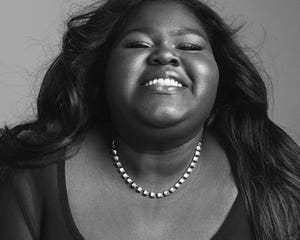 Cass Bird for Lane Bryant
Cass Bird for Lane Bryant
Gabourey Sidibe, Danielle Brooks & Ashley Graham Tackle Haters In Their Lingerie
View StoryWhat's your favorite inspirational quote that you use as a mantra?
Rosa Barney: “Comparison is the thief of joy.” –Theodore Roosevelt. I have to repeat this to myself often, especially because of social media. It is so easy to see a picture of someone on a fabulous vacation and feel sorry for yourself because you're at work. Or see someone rocking an outfit that you don't feel comfortable in, or see friends buying things that you want, the list goes on! When you compare yourself or your situation to others you rob yourself of the chance to be joyful. Live your own life, focus on your own goals and you will be happy.
Nadia Aboulhosn: “Identify your problems, but give your power and energy to solutions. If you do what you've always done, you'll get what you've always gotten. I've come to believe that all my past failure and frustration were actually laying the foundation for the understandings that have created the new level of living I now enjoy.” – Tony Robbins
Megan Crabbe: "The woman wins who calls herself beautiful, and challenges the world to change to truly see her". It's from "The Beauty Myth" by Naomi Wolf.
Loey Lane: Every day of my life I remind myself to keep moving forward. Our lives are short and beautiful and nothing is for certain except for the time we have right now. Don't waste your time on the negativity. Focus on the beautiful and happy life you're destined to live. Keep moving forward.
Melissa Gibson: You know, I'm not one for mantras, but I constantly know and recognize how body positivity impacts and has shaped my life. I take notice of the choices I make now and how people react. That's empowering and inspiring to me.
How do you feel body positivity ties into feminism, if at all?
Rosa Barney: I think social media has been a huge catalyst for the body positive movement. Social media is a community and it makes it easy for all of us to share our stories. There are so many great accounts embracing women of all sizes and recognizing that beauty is definitely not one size fits all.
Nadia Aboulhosn: It ties in to feminism because it breaks away from the history of women wanting their bodies to fit a certain mold that society created versus what you create for yourself.
Megan Crabbe: There's no such thing as body positivity without feminism! Our body images issues are a direct product of patriarchal beauty standards and the idea that the most important thing about a woman is how she looks. We can't dismantle our cultural body hatred without waving the flag for feminism loud and proud!
Loey Lane: Body positivity is for everyone, but I feel that as women we are constantly competing and trying to outdo one another. That sense of competitiveness has definitely been instilled by society. To say to yourself "I am beautiful in my way and you are beautiful in your way" creates a sort of sisterhood and a positive bond among women. We are scrutinized day in and day out for our looks and it's comforting to have a common ground of both struggles in our image and self love.
Melissa Gibson: I think they are intimately related. Body politics have impacted women in a unique way. Diet culture and the beauty industry have targeted us specifically. We are told we need to take up less space, quiet ourselves, be pretty, and make the men in our lives happy. We are seen as a reflection of the men we date (super heteronormative, I know, but I'm talking about mainstream womanhood). Naomi Wolf says this in her book, The Beauty Myth, "A culture fixated on female thinness is not an obsession about female beauty, but an obsession about female obedience. Dieting is the most potent political sedative in women's history; a quietly mad population is a tractable one.” I think there is so much to be said about the time and energy women have felt they have had to be put into the way they look that they could have been putting into anything else. We are too bad ass to be obsessed with thinness.
How do you feel that social media has inspired others to follow example of accepting one another the way we are, and what direction do you see the body positivity movement heading as a result?
Nadia Aboulhosn: Social media is really the forefront of body positivity. I think it gives people their own platform to show their world and seeing other people who look like them on it helps them feel more comfortable with themselves. It makes them feel like they're a part of something bigger. I think the movement is heading in a where women above a size 14 need to be represented. Also larger men are starting to be represented which I'm super happy about.
Megan Crabbe: Social media is definitely a double edged sword, there's so much toxic shit on there, but it's also an amazing tool for social movements like body positivity. I think bopo will keep growing, I also think that diet culture will push back against it at every step, but I really do believe that we're powerful enough to win.
Loey Lane: Social media gives us such a personal connection with one another even if we live a thousand miles apart, and body positivity has flourished on platforms like Instagram and YouTube. I see body positivity expanding further and people continuing to have productive conversations about self-love and its importance.
Melissa Gibson: Social media is used for evil every day, I believe body positivity is just one of the many ways it is being used for good. Social media allows us for the first time in our life to self-represent our lives for what they are without a middle person manipulating the image or message. I believe this is the power of Body Positivity, we have to color and add layers to what it means to exist in marginalized bodies because we are just as fully human and complex and valuable as anyone else. Fat people are changing the world, black people are making the world a better place, trans folks are a part of what makes the world a beautiful and exciting and enriching place. We are not a burden or a problem to eradicate, we are part of what makes the world a better place.
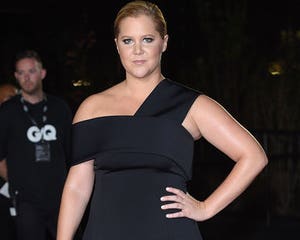 Getty Images
Getty Images
Amy Schumer Body-Shamed After Being Tapped to Play Barbie
View StoryIf you could tell your younger self one thing, what would it be?
Rosa Barney: Stop listening to the negative voice in your head. Stop trying to fit into a mold that you will never fit into – break the mold and find your happiness.
Nadia Aboulhosn: I would tell my younger self to work harder at a younger age so I could've gotten to where I am now, sooner. To not waste my time doing things that weren't meaningful.
Megan Crabbe: I would tell my younger self that how she looks is the least important thing about her. I would try to show her that she was more to do in this world than lose weight and look like those images of beauty she's seeing all around her.
Loey Lane: If I could have five minutes with my younger self I would give her a hug and a sandwich. I would tell her she was beautiful and that everything will be okay. I would tell her to give herself a break.
Melissa Gibson: You've always been badass, don't believe any differently.
Where do you see yourself in 10 years?
Rosa Barney: In 10 years I hope that I will still be modeling but I hope that I will no longer have to advocate for body positivity. I hope that by then it will just be the accepted normal way of life. That everyone and every size will feel good about themselves and that we will no longer make people feel badly for their appearance.
Nadia Aboulhosn: A successful clothing line that seasonally shows at NYFW for ready-to-wear and a house somewhere remote with a husband and kids.
Megan Crabbe: In 10 years I see myself surrounded by dogs and baked goods, rocking my bikini and smashing diet culture daily. Seriously that's the dream.
Loey Lane: I hope to see myself in ten years with a size-inclusive clothing range for everyone to feel confident in. I'm not certain of the way I will look physically but I know I will still practice self love daily.
Melissa Gibson: Living my truth every day, fighting to make the world a better place, hopefully as an amazing lawyer fighting to make the world more inclusive of people of all sexualities, gender identities, ethnicities, races, and religions. Mostly I hope to still be loving authentically, speaking my mind, and cultivating joy and friendships.

